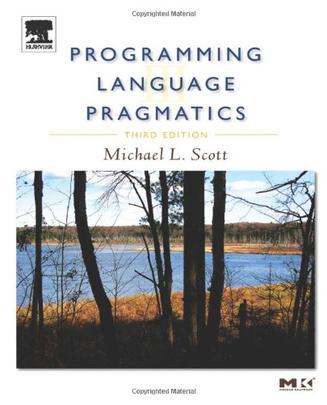-

Modern Compiler Implementation in Java
This textbook describes all phases of a compiler: lexical analysis, parsing, abstract syntax, semantic actions, intermediate representations, instruction selection via tree matching, dataflow analysis, graph-coloring register allocation, and runtime systems. It includes good coverage of current techniques in code generation and register allocation, as well as the compilation of functional and object-oriented languages, that is missing from most books. The most accepted and successful techniques are described concisely, rather than as an exhaustive catalog of every possible variant, and illustrated with actual Java classes. The first part of the book, Fundamentals of Compilation, is suitable for a one-semester first course in compiler design. The second part, Advanced Topics, which includes the compilation of object-oriented and functional languages, garbage collection, loop optimization, SSA form, instruction scheduling, and optimization for cache-memory hierarchies, can be used for a second-semester or graduate course. This new edition has been extensively rewritten to include more discussion of Java and object-oriented programming concepts, such as visitor patterns. A unique feature is the newly redesigned compiler project in Java, for a subset of Java itself. The project includes both front-end and back-end phases, so that students can build a complete working compiler in one semester. -

Modern Compiler Implementation in C
This new, expanded textbook describes all phases of a modern compiler: lexical analysis, parsing, abstract syntax, semantic actions, intermediate representations, instruction selection via tree matching, dataflow analysis, graph-coloring register allocation, and runtime systems. It includes good coverage of current techniques in code generation and register allocation, as well as functional and object-oriented languages, that are missing from most books. In addition, more advanced chapters are now included so that it can be used as the basis for a two-semester or graduate course. The most accepted and successful techniques are described in a concise way, rather than as an exhaustive catalog of every possible variant. Detailed descriptions of the interfaces between modules of a compiler are illustrated with actual C header files. The first part of the book, Fundamentals of Compilation, is suitable for a one-semester first course in compiler design. The second part, Advanced Topics, which includes the advanced chapters, covers the compilation of object-oriented and functional languages, garbage collection, loop optimizations, SSA form, loop scheduling, and optimization for cache-memory hierarchies. -

Modern Compiler Implementation in C
This new, expanded textbook describes all phases of a modern compiler: lexical analysis, parsing, abstract syntax, semantic actions, intermediate representations, instruction selection via tree matching, dataflow analysis, graph-coloring register allocation, and runtime systems. It includes good coverage of current techniques in code generation and register allocation, as well as functional and object-oriented languages, that are missing from most books. In addition, more advanced chapters are now included so that it can be used as the basis for a two-semester or graduate course. The most accepted and successful techniques are described in a concise way, rather than as an exhaustive catalog of every possible variant. Detailed descriptions of the interfaces between modules of a compiler are illustrated with actual C header files. The first part of the book, Fundamentals of Compilation, is suitable for a one-semester first course in compiler design. The second part, Advanced Topics, which includes the advanced chapters, covers the compilation of object-oriented and functional languages, garbage collection, loop optimizations, SSA form, loop scheduling, and optimization for cache-memory hierarchies. -

Linkers and Loaders
Whatever your programming language, whatever your platform, you probably tap into linker and loader functions all the time. But do you know how to use them to their greatest possible advantage? Only now, with the publication of Linkers & Loaders, is there an authoritative book devoted entirely to these deep-seated compile-time and run-time processes. The book begins with a detailed and comparative account of linking and loading that illustrates the differences among various compilers and operating systems. On top of this foundation, the author presents clear practical advice to help you create faster, cleaner code. You'll learn to avoid the pitfalls associated with Windows DLLs, take advantage of the space-saving, performance-improving techniques supported by many modern linkers, make the best use of the UNIX ELF library scheme, and much more. If you're serious about programming, you'll devour this unique guide to one of the field's least understood topics. Linkers & Loaders is also an ideal supplementary text for compiler and operating systems courses. *Includes a linker construction project written in Perl, with project files available for download. *Covers dynamic linking in Windows, UNIX, Linux, BeOS, and other operating systems. *Explains the Java linking model and how it figures in network applets and extensible Java code. *Helps you write more elegant and effective code, and build applications that compile, load, and run more efficiently. -

现代编译原理
《现代编译原理:C语言描述》全面讲述了现代编译器的结构、编译算法和实现方法,是Andrew w.Apple的“虎书”——Modern Compiler Implementation——“红、蓝、绿”三序列之一。这三本书的内容基本相同。但是使用不同的语言来实现书中给出的一个编译器。本书使用的是更适合广大读者的c语言,而另外两本书分别采用ML语言和Java语言。本书的另一个特点是增加了一些其他编译原理教科书没有涉及的内容。前端增加了面向对象的程序设计语言、函数式程序设计语言等现代语言的编译实现方法,后端增加了针对现代计算机体系结构特征的一些比较成熟的优化方法。这部分内容展现了现代商业编译器需解决的一些关键问题,开拓了学生的视野,为学生未来进行更深入的研究奠定了基础。 《现代编译原理:C语言描述》全面讲述了现代编译器的各个组成部分,包括词法分析、语法分析、抽象语法、语义检查、中间代码表示、指令选择、数据流分析、寄存器分配以及运行时系统等。全书分成两部分,第一部分是编译的基础知识,适用于第一门编译原理课程(一个学期);第二部分是高级主题,包括面向对象语言和函数语言、垃圾收集、循环优化、ssA(静态单赋值)形式、循环调度、存储结构优化等,适合于后续课程或研究生教学。书中专门为学生提供了一个用C语言编写的实习项目,包括前端和后端设计,学生可以在一学期内创建一个功能完整的编译器。 -

Programming Language Pragmatics, Third Edition
Programming Language Pragmatics is the most comprehensive programming language textbook available today. Taking the perspective that language design and language implementation are tightly interconnected, and that neither can be fully understood in isolation, this critically acclaimed and bestselling book has been thoroughly updated to cover the most recent developments in programming language design. With a new chapter on run-time program management and expanded coverage of concurrency, this new edition provides both students and professionals alike with a solid understanding of the most important issues driving software development today. Classic programming foundations text now updated to familiarize students with the languages they are most likely to encounter in the workforce, including including Java 7, C++, C# 3.0, F#, Fortran 2008, Ada 2005, Scheme R6RS, and Perl 6. New and expanded coverage of concurrency and run-time systems ensures students and professionals understand the most important advances driving software today. Includes over 800 numbered examples to help the reader quickly cross-reference and access content.